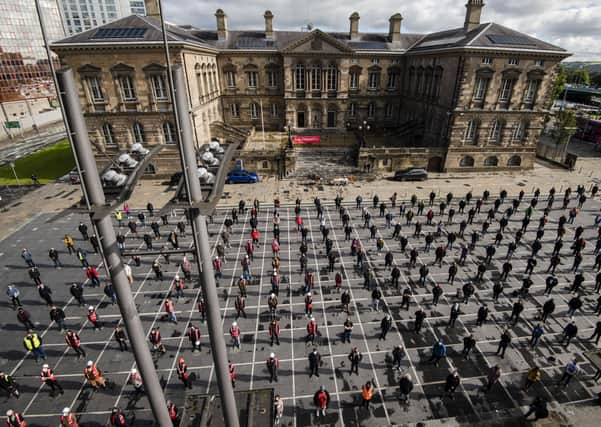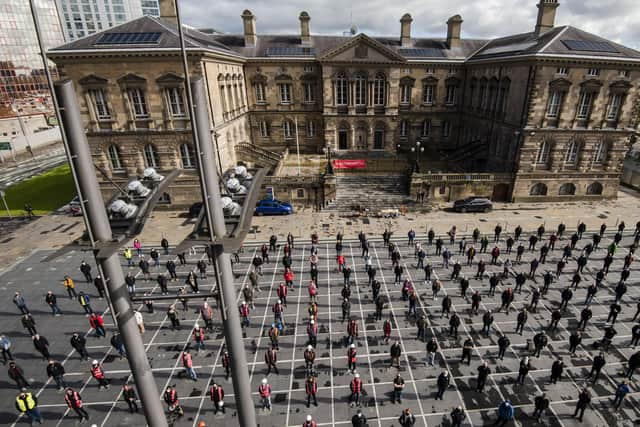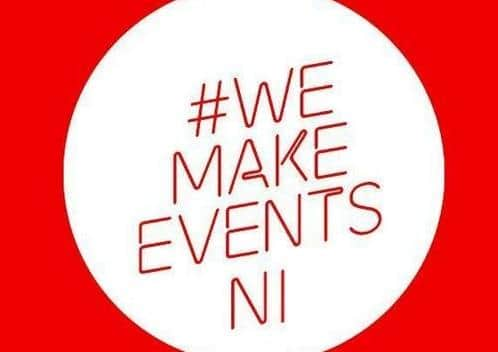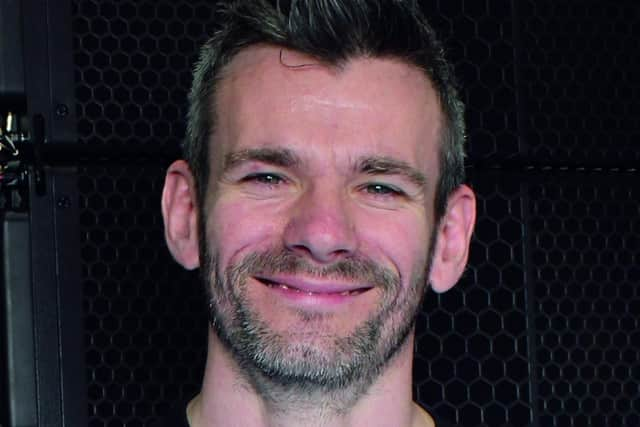Under-threat Northern Ireland music industry is not going down without a fight


The 46-year-old tour rigger is now facing uncharted times along with the rest of his beloved music industry – a sector which had previously shown to be recession-proof and which had provided a beacon of hope during the Troubles.
Sean, who is also director of technical rental company PSI, is the Northern Ireland lead on We Make Events – a campaign calling for support for the government to help an industry which is on the brink of collapse.
Advertisement
Hide AdAdvertisement
Hide AdSean said: “This whole campaign has been odd for us, we are the invisible people.


“I’ve been doing this job for 29 years, it’s been my job to be unseen and unheard, that’s the case for all us.
“We’re now at a point where we’ve been thrust into the limelight, we have to be in order to get our story heard and get the recognition that we need help. It’s a sector that never ever in the past has needed any help.
“In times of recession we do okay because events and shows are a lifeline to people, it’s how people escape the depression, it’s a relief from day to day woes. This is the first time ever that we’ve not been able to provide that release.
Advertisement
Hide AdAdvertisement
Hide Ad“The sector did very well around the 2008/2009 period whenever we had the big financial crash, because people couldn’t afford to move house, go on holiday or buy a new car.


“What do you do to try and escape the depression of every day drudgery? You go and see a show, you forget your worries for an hour and a half, two hours.”
Even during the worst of the Troubles, musicians continued to put on shows as a form of release. Bands like Stiff Little Fingers were born, with their song ‘Alternative Ulster’ becoming an anthem for change.
Sean discussed how music can also provide direct aid to people and places in crisis: “If you consider one of the first things after people have been in to help out after a disaster, after the medics have done all they can the fundraising starts to get aid to these people.
“The events industry is always turned to for that.


“Everyone remembers events like Live Aid.”
Advertisement
Hide AdAdvertisement
Hide AdAs director of PSI Sean steers a company which does lighting, sound, rigging and production for live events throughout Northern Ireland and the Republic. His company also holds the holds contract for events in the SSE Arena.
Asked when he thought live music could get back on track he said: “There are some events that are still scheduled but when they get closer to the time they get cancelled.
“Shows are generally being postponed for around a year.”
As far as new shows are concerned he said: “I’m seeing more of a trend for new shows not really sticking their toe in the water until September 2021 onwards.
“That’s 12 months from now, when you take into consideration the amount of time, effort and planning that goes into even a UK and Ireland tour, nobody can start planning that until they know it’s safe and viable.
“We’re looking pretty far off at the moment.”
So how long can the music industry survive?
Advertisement
Hide AdAdvertisement
Hide Ad“This is entirely dependent upon what financial aid we’re able to get,” said Sean.
“There’s £33 million has come down from the £1.5 billion from Westminster that hasn’t been allocated yet, that still sits with the Executive and they have to decide who it goes to and how it gets there.
“That is a potential lifeline for so many companies and so many individuals.
“An awful lot of freelance staff have fallen between the cracks in this and aren’t getting enough financial aid to live on.”
Advertisement
Hide AdAdvertisement
Hide AdSean said that around 400 people are needed to put on a single show: “Imagine if you’re going to see Ed Sheeran, you’re looking at one person on stage, but to make an event happen you’ve got a workforce of around 400 people behind that one act.
“That’s everybody from venue staff, security, marketing, publicity, cleaners, caterers, the crew, lighting, sound, riggers, sets, stage management, local crew and local riggers.”
Sean is also involved in training, apprenticeships and outreach to schools: “I’m very passionate about making it clear to schools that a career in the events industry is an actual career, not just some whimsical hobby that people get into.”
Nearly 7,500 people’s livelihoods are invested in the Northern Ireland music sector.
Advertisement
Hide AdAdvertisement
Hide AdFigures from last year showed that freelance staff make up over twice the number of employees (nearly 5,000) to the industry’s 2,400 full-time equivalent staff.
Sean said: “I’ve worked 29 years in this industry, every week of my working life since I was 17, when I was still in college.
“The people that we have in our industry have an absolute passion and love for what they do and for this industry in itself.
“You’re not going to get people in the events sector who are just doing a job because it’s a way to earn money, when you look at the amount of hours that people work there are much easier ways to earn your living.
Advertisement
Hide AdAdvertisement
Hide Ad“The people who work in our sector have such a passion and drive for everything they do and are so dedicated to what they do that they always go, not that extra mile, but that extra 26 miles to make something happen.
“Everybody who works in this sector do so because they love it, I’m no different.
“I absolutely love what I do, I love the challenges and I love the day-to-day differences and the relationships that you have with people.”
He said being part of the music industry was like being part of a family: “When you’re on tour living day-to-day with the people you work with, they become your social circles, your friends and more than that, they become your family.
Advertisement
Hide AdAdvertisement
Hide Ad“I can’t think of any other industry other than perhaps in the military where you’re so closely knit and thrust together and living 24/7 in each other’s pockets.”
He continued: “Whenever the lockdown first happened and everybody had to go home and lock down with their own families, those of us in the industry didn’t only lose our employment, we lost access to our families and friends.
“That’s because the people that we spend our time touring about in a bus with or working in a warehouse with, those are our friends and family.
“The number of in-industry friends easily outweighs the number outside of it.”
Advertisement
Hide AdAdvertisement
Hide AdOver 500 members of the live events community gathered in a Covid-compliant display at Belfast’s Custom House Square on Friday.
Professions ranging from riggers to sound engineers, tour managers to truck drivers, wore masks and had pre-registered for track and trace as per current Government guidelines during the event organised by We Make Events NI.
The Northern Irish workers stood in defiance of the Government’s latest financial move.
Events producer Dino Cafolla said: “The UK Government has offered a 33% wage top up in order to help navigate the next few months. Our industry has not worked since mid-March, so 33% of nothing, is nothing.
Advertisement
Hide AdAdvertisement
Hide Ad“We’re showing MPs that not only are we the most qualified industry to keep people safe at events, but telling them that we’d like to work together on a roadmap which allows our workforce to return. A blanket ban on all events has, in certain circumstances, resulted in illegal, unsafe gatherings by the general public. This only further hinders our industry’s financial recovery.”
More events are due to take place on Wednesday to highlight the plight of the NI music industry.